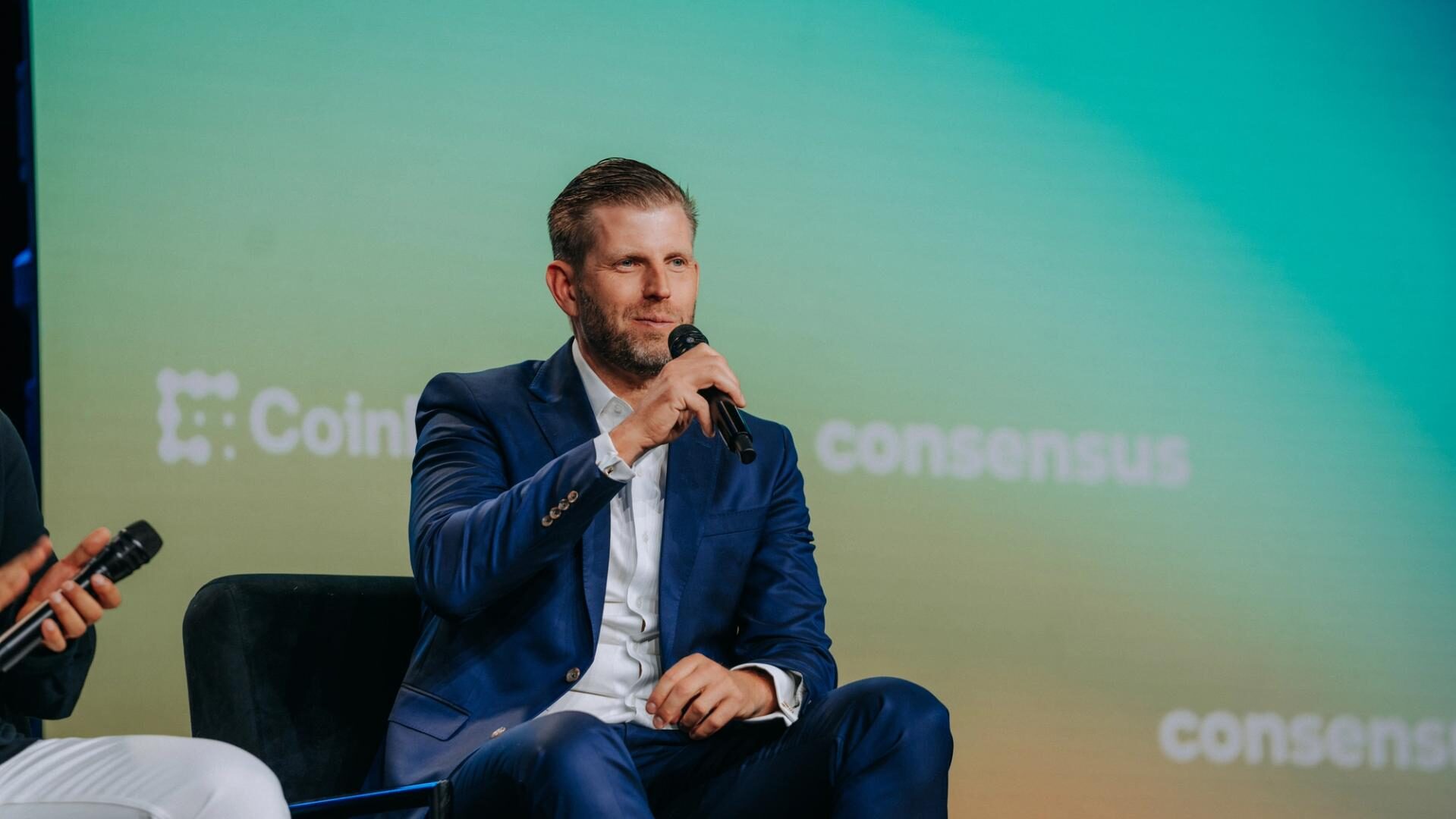BTC
$103,610.67
+
0.31%
ETH
$2,550.23
–
1.86%
USDT
$1.0002
+
0.01%
XRP
$2.4756
–
3.13%
BNB
$656.26
+
0.54%
SOL
$171.90
–
2.32%
USDC
$0.9999
+
0.00%
DOGE
$0.2248
–
3.45%
ADA
$0.7801
–
2.27%
TRX
$0.2756
–
0.68%
SUI
$3.9218
–
0.06%
LINK
$16.39
–
2.95%
AVAX
$23.67
–
5.47%
XLM
$0.2988
–
1.78%
SHIB
$0.0₄1500
–
4.89%
HYPE
$25.67
+
2.27%
HBAR
$0.2000
–
2.91%
LEO
$8.8752
+
0.91%
BCH
$395.78
–
1.80%
TON
$3.1065
–
4.69%
Consensus Toronto 2025 Coverage
May 15, 2025, 5:44 p.m.

- Eric Trump, son of former President Donald Trump, views bitcoin as digital gold and a store of value.
- He became interested in cryptocurrency when politics connected the Trump family with the crypto community.
- Trump co-founded American Bitcoin, a mining firm planning to go public through a merger with Gryphon Digital Mining.
TORONTO —Eric Trump, the son of U.S. President Donald Trump, said he believes bitcoin is digital gold and called the largest digital currency a store of value, during a packed panel at Consensus 2025 in Toronto.
“I really believe in digital gold, which is bitcoin, right? I believe in the store of value,” Trump said.
STORY CONTINUES BELOW
However, Eric Trump — who has a background in real estate — told the crowd at CoinDesk’s Consensus 2025 conference in Toronto that he didn’t get into bitcoin or crypto until politics intertwined the Trump family and the crypto community.
“It wasn’t until the very same group that was attacking my family for no reason whatsoever other than political beliefs, started attacking [the] crypto community that it really drove two people who might not have always been like-minded together and that partnership has been absolutely amazing,” he said Thursday.
Aside from politics, he also realized real estate is not as liquid as bitcoin, which has better liquidity and was easier to transact, solidifying his belief in the digital currency. “I also realized, kind of, through some of that political weaponization, you know, some of the limitations of real estate. Real estate has created tremendous wealth for our family. At the same time, real estate can’t be transferred. It’s very hard to sell,” he said.
“I sold a hotel two years ago. It took me a year and a half to literally transact that hotel because you have title reports and you have managers that have to go in, and you have best proliferations. You do all sorts of things,” Trump said. “… You constantly have to manage it. You constantly have to watch operations, right? And then all of a sudden, you’ve got this kind of digital asset which you don’t need to watch, you don’t need to manage. You know, it’s easy to transact on.”
Trump is the co-founder and chief strategy officer of American Bitcoin, a Bitcoin mining firm founded in partnership with Hut 8 and slated to go public via a merger with Gryphon Digital Mining (GRYP).
The Gryphon partnership came about from a desire to take the American Bitcoin partnership public as quickly as possible, said Hut 8 CEO Asher Genoot on stage alongside Trump to a standing-room only crowd. An existing mining business was a key part of that plan as well as getting ‘American’ and ‘bitcoin’ as part of the company name.
“American Bitcoin, to me, is everything, you know. And I we came up with the name, I said one thing. I said, Listen, it has to have the word American, and it has to have the word Bitcoin in it,” Trump said.
Nikhilesh De is CoinDesk’s managing editor for global policy and regulation, covering regulators, lawmakers and institutions. He owns < $50 in BTC and < $20 in ETH. He won a Gerald Loeb award in the beat reporting category as part of CoinDesk’s blockbuster FTX coverage in 2023, and was named the Association of Cryptocurrency Journalists and Researchers’ Journalist of the Year in 2020.
Aoyon Ashraf is CoinDesk’s Head of Americas. He spent almost a decade at Bloomberg covering equities, commodities and tech. Prior to that, he spent several years on the sellside, financing small-cap companies. Aoyon graduated from University of Toronto with a degree in mining engineering. He holds ETH and BTC, as well as ADA, SOL, ATOM and some other altcoins that are below CoinDesk’s disclosure threshold of $1,000.



